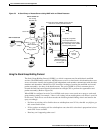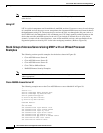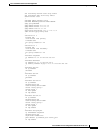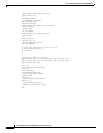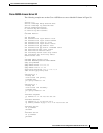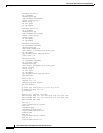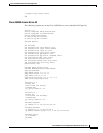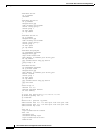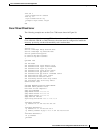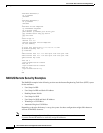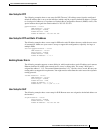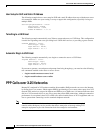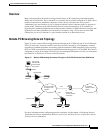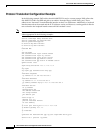
Telco and ISP Dial Scenarios and Configurations
Large-Scale POPs
DNC-329
Cisco IOS Dial Services Configuration Guide: Network Services
User Setup for PPP
The following example shows a user setup for PPP. The user’s IP address comes from the configured
default IP address that is set up on the interface (which could be a specific default IP address, a pointer
to a local pool of addresses, or a pointer to a Dynamic Host Configuration Protocol (DHCP) server). The
special address that signals the default address is 255.255.255.254.
pppme Password = "cisco"
CHAP-Password = "cisco"
Service-Type = Framed,
Framed-Protocol = PPP,
Framed-IP-Address = 255.255.255.254
User Setup for PPP and Static IP Address
The following example shows a user setup for PPP and a static IP address that stays with the user across
all connections. Make sure your router is set up to support this configuration, especially for large or
multiple POPs.
staticallypppme Password = "cisco"
CHAP-Password = "cisco"
Service-Type = Framed,
Framed-Protocol = PPP,
Framed-IP-Address = 1.1.1.1
Enabling Router Dial-In
The following example supports a router dialing in, which requires that a static IP address and a remote
Ethernet interface be added to the network access server’s routing table. The router’s WAN port is
assigned the address 1.1.1.2. The remote Ethernet interface is 2.1.1.0 with a class C mask. Be sure your
routing table can support this requirement. You might need to redistribute the static route with a dynamic
routing protocol.
routeme Password = "cisco"
CHAP-Password = "cisco"
Service-Type = Framed,
Framed-Protocol = PPP,
Framed-IP-Address = 1.1.1.1
Framed-Route = "2.1.1.0/24 1.1.1.2"
User Setup for SLIP
The following example shows a user setup for SLIP. Remote users are assigned to the default address on
the interface.
slipme Password = "cisco"
Service-Type = Framed,
Framed-Protocol = SLIP,
Framed-IP-Address = 255.255.255.254



